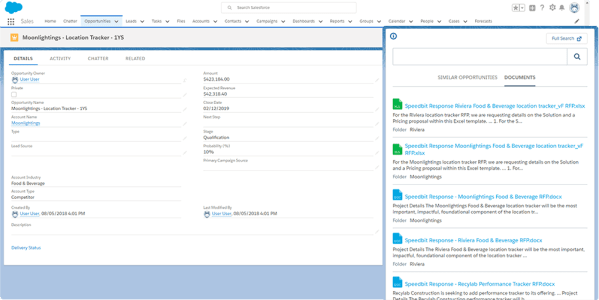For your sales reps, their Customer Relationship Management (CRM) platform is the go-to location for the information they need to move deals through the pipeline to close. It puts all of the relevant information about a given customer at their fingertips and serves as a single window for the entire sales process.
At least, it’s supposed to be that way. As all sales leaders know, the reality is that sales reps more often than not are working anywhere but their CRM system. In fact, on average, only18% of a sales rep’s time is spent working in the system. Instead of keeping that (expensive) single view of the customer in sight, sales reps are jumping out to search through emails and the company intranet or pinging colleagues for assistance to find what they need to sell.
The resulting inefficiency is not just a waste of time and money as your CRM system goes underutilized. It also has a real impact on the sales cycle. In this article, we’re going to dive deeper into the ways that your CRM system is creating irrelevant customer and employee experiences – and how to remedy that problem.
Spinning Your Wheels in the Sales Cycle
The CRM system contains the most valuable information in your business (besides your product patents, of course!) because it provides historical insights into past deals and those currently in the works. That includes insights into the assets and messages that move deals through the sales cycle.

In the real world, your unintelligent and underutilized CRM begins impacting your sales reps from the moment they come onboard. That’s because the CRM is a patchwork of information and outdated, out-of-context assets that sometimes do more harm than good for new reps trying to learn the ins-and-outs of the sales cycle. For new sales reps, learning about the buyer’s journey and concerns can take months; and those months spent learning often equate to months spent not closing deals.
As much as the CRM system is aboutclosing the gap between the sales rep and the customers’ needs, the truth is that it should also be about closing the gap between marketing and the sales reps. Let’s take a quick spin through the sales cycle to show you what I mean.
1) Outbound sales
Drumming up opportunities from cold leads is one of the more challenging – and time-consuming – ways a sales rep spends their days. Marketing teams are spending gobs of money constantly creating new assets, putting out new messaging, and updating old slides and content for sales to use. From this constantly swirling vortex of content, sales reps need to pluck the relevant content that will speak to the prospect and garner a response.
For most sales teams, uncovering the relevant assets in the CRM system for this stage can be harder than finding a needle in a haystack, as it isn’t entirely clear what they need or what is available to them. Considering that 42% of sales reps feel they don’t have enough information before making a call according to Lattice Engine, the fewer barriers there are for sales reps to get the content they need, the better.
2) Nurturing deals
Every deal that moves through the pipeline, whether it’s closed-won or closed-lost, provides a wealth of information for your sales teams. Over years of selling by dozens of sales reps, insights for nurturing deals to increase their velocity and success rate become impossible to share succinctly. That’s where the CRM comes into play – or at least it should.

Too many reps struggle with finding the right content to send to their prospects. In fact,65% of sales reps have this problem. It’s usually not due to lacking content but rather having a plethora of content to use at each stage of the sales cycle without any way to determine what would be most relevant in a given scenario.
Thus, you not only end up with frustrated reps looking for content to accelerate their deals, but you also end up with poor messaging and breaches in compliance. Old content surfaced in the CRM may lead to sales reps sharing different messaging about everything from the brand vision to the T’s and C’s for the deal. Plus, those out-of-date pitch decks, for example, may reveal customer logos that are no longer permissible to share.
3) Closing deals
Closing a deal is the most difficult part of the job – right behind prospecting – according tomore than one-third of sales reps. Not only are you in the middle of a high-stakes negotiation where you need to cater to the needs of multiple parties, but you also have to deal with the uncomfortable odds of other stakeholders or new competition coming into the deal late in the game
In these crucial hours, days, and weeks, having the right content to tamp down any new objections or competition is critical. Sales reps are often working to their prospects’ timeline, so finding the most relevant content quickly can mean the difference between getting your perspective into that internal meeting or letting your competition control the narrative.
The Cost of the Unintelligent CRM System
In our work-from-home world, the pains usually associated with an unintelligent and irrelevant CRM system have only been exacerbated. No more quick stand-ups over the cubicle walls means less communication between sales reps. And that not only increases the importance of instituting a CRM system that delivers consistent, relevant insights into the sales cycle but also the cost of not doing so.

According to our own research in our Workplace Survey, at this moment in time, 85% of employees are not completely confident in the information that they share externally. The reasons for this lack of confidence varied, but the top explanations include:
- 39% worry the information is out of date
- 26% worry about relevance
- 25% aren’t confident about the information’s accuracy
- 25% aren’t even sure if they’re allowed to share it
If you’re a sales leader, the hairs are probably standing up on the back of your neck thinking about sales reps sending out-of-date, inaccurate, internal-eyes-only content.
And that’s a valid reaction, as the consequences of sales reps’ uncertainty are manifold.
The employee experience is, of course, impacted. In fact, our Workplace Survey found that 16% of respondents are ready to quit out of data-finding frustrations. When employees can’t get the relevant content and information they need, it makes the job feel impossible to manage. In the age of way-too-much-data-to-handle, it’s important for companies to provide employees with the tools they need to cut down on wasted time and to focus on making an impact. For the sales team, all of this frustration and time-wasting means deals aren’t getting closed and revenue targets aren’t being met.

A bad employee experience more often than not also directly results in a cost to the company’s reputation. Off-brand, out-of-date, irrelevant content sends a confusing message to prospects who are also seeing the glitziest, glammiest, most-relevant content from marketing channels.
When your sales reps don’t reflect the best of what the company has to offer, it opens up the door to doubt throughout the sales cycle. If they can’t keep this stuff straight, how are we going to make it through implementation with them?
You’re Not Doomed to Irrelevance
There is a way, however, to quell your prospects’ doubts and bring confidence to your sales reps. By meaningfully applying artificial intelligence and machine learning, you can help your CRM system – and your sales reps – live up to their promise.
When you layer in aRelevance Platform to your CRM experience, you solve two of the biggest challenges your sales reps have with the system.
First of all, you’ll be able to unify all of your information from across the organization into that single window. Not only will this reduce the number screen-hopping searches by making all of the case studies, FAQs, slides, and more available right where the sales reps work, but it will also allow your reps to find the information they need far faster once they do enter a search. Machine learning that surfaces the most relevant content based on customized rules ensures reps are only dealing with the content that matters to the customer at hand when they land on a results page.

Secondly, AI-powered recommendations and analytics ensure that every sales interaction pays dividends for other reps as that knowledge is shared across the team. High-performing content can be automatically recommended alongside insights of how and when that asset was used in the past, effectively coaching new and old reps alike on what’s working to accelerate the sales cycle. And when there’s a gap in the content, the AI can flag that as an opportunity for new pieces to be created to support the deal. For example, if there’s no late-stage deck that’s performing well for FinServ prospects, analytics can highlight this performance gap.
The added bonus of solving these two challenges with an AI-powered Relevance Platform is that it just gets better over time. Your typical unintelligent CRM becomes convoluted with old content and hard-to-decipher insights the larger the database grows. But with the added layer of a Relevance Platform, recommendations and insights dynamically shift alongside the performance of your reps and the content they’re using.
When it comes down to it, delivering relevant content and information to your sales rep within the CRM will deliver benefits in five areas:
1. Content is unified and accessible where sales reps should be spending their time;
2. Deal-specific content recommendations become possible and improve over time;
3. Stage-specific content recommendations become possible and improve over time;
4. Onboarding becomes easier when you remove the barriers to finding relevant content;
5. Insights into the employee experience inform your training and content needs.
By addressing these five areas, you’re not only going to make your sales reps better at their jobs, you’re going to give your (future) customers a better experience as well. In a work-from-home world where everything is more difficult and everyone is more distracted, finding the right information shouldn’t be the leading reason your sales reps struggle with their job.
Learn more about how applying AI can help you build a relevant end-to-end sales experience by watching the video below:
Discover What Relevance Can Bring to Your CRM System
What would it mean for your sales teams’ performance if they were confident in every piece of content they shared with a prospect through the sales cycle?
If you’re ready to apply artificial intelligence and machine learning to bring relevance into your not-so-smart CRM system,see what a Relevance Platform can do for your sales team today.


